
|
History of Sex in Cinema: 1986 - 1 |

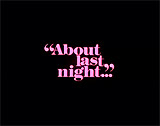
|
About Last Night... (1986) Director Edward Zwick's R-rated romantic comedy-drama (his directorial debut film) was based on David Mamet's 1974 play "Sexual Perversity in Chicago." It starred two celebrated members of Hollywood's 'Brat Pack' at the time, Demi Moore and Rob Lowe. [Note: They were two of Hollywood's infamous 'Brat Pack' who had starred together as Billy and Jules in the earlier pre-Generation X 1980s flick, director Joel Schumacher's St. Elmo's Fire (1985).] The perceptive relationship drama was set in the summer of 1980; the story told about the hot relationship between two Windy City twenty-somethings in a singles-crazed world; it was noted for its frank and often vulgar sexual dialogue, four musical montages, a pop-rock soundtrack, sensual love scenes, and the emotionally-honest ups and downs of sexual politics. Its lengthy tagline was: "It's about men, women, choices, sex, ambition, moving in, no sex, risk, underwear, friendship, career moves, strategy, commitment, love, fun, breaking up, making up, bedtime, last night..." The two soon-to-be-lovers flirtatiously met at a softball game, and then at Mother Malone's bar on Chicago's Gold Coast:
The two entered into a torrid relationship that began with a passionate one-night stand after becoming briefly acquainted at the bar after the ball game. He invited her to his place to listen to his new stereo, to kiss, and then to have sex (off-screen). She left in the middle of the night after excusing herself: "It's been a slice of heaven, I just have to go home. It's a habit of mine." She admitted to her roommate Joan when she arrived back at her own place that she felt an intense physical attraction to Danny:
Debbie vowed to herself never to repeat the experience, and called up Danny the next morning at work to facetiously apologize: "Listen, I was pretty drunk last night. Did anything happen?...It was a fluke. Last night was a fluke." Meanwhile, in the film's messy love triangle arrangement, Debbie was also involved in an affair with her sleazy boss Steve Carlson (Robin Thomas) - against Joan's wishes: "It's really stupid to f--k your boss." Debbie put off Steve's invite: "Are you busy for lunch? How about a nice long one at my apartment?" However, she couldn't resist meeting up with Danny again at Mother's that night. This second time in two days, she returned with him to his place for another round of sex. She coyly and jokingly admitted that she had experienced an orgasm: "Couldn't you tell?...We figure we'll just keep you in the dark and that way maybe you'll work a little harder....It's a conspiracy." She decided to spend the entire night with him. Sheena Easton's "So Far, So Good" played under the film's first montage of the development of their relationship the next full day (a Cubs ball-game, walking hand in hand, lunches, etc.) when both of them didn't show up for work (and later caught flack), and ignored their friends. However, the two often confided and spoke honestly with their best friends, who were prone to sabotage their fragile relationship with negative attitudes (and the film's 'comic relief'):
Debbie did sleep one more time with Steve in the midst of her growing infatuation with Danny, but decided on her own that her affair with Steve was finished: "I don't think I can see you anymore...I think you're terrific. It's, it's just that, well, I'm-I'm seeing someone else...It was kind of sleazy. And now, it's kind of over," now that she was permanently seeing Danny. When Debbie again met up with Danny (after not seeing him for a few days), she didn't want to appear too eager: ("Dan, I may be easy, but I'm not stupid"), but he charmed her and soon they were ripping off each other's clothes. They made love together (the first on-screen explicit sex between them) - clenched together and seated in a bathtub as the shower water drenched them from above, as she told him: "You're so good...you're the best...I love making love with you too." Soon after, on the train, Bernie asked Danny: "Does she give head?...Does she give head to you?" but Danny refused to answer. The relationship between Danny and Debbie became more intense as they saw more of each other. And after two months, Danny asked if she could move in with him: ("I think maybe you ought to have a drawer over here"). It was a "pretty big step," but they both decided to proceed, although Joan's first reaction was one of hurt and abandonment, and she predicted it wouldn't work out ("I give you two months"). A second musical montage, to the tune of Sheena Easton's "Natural Love" accompanied Debbie's move. Almost immediately, they realized the monumental upheaval in their lives: ("We talked about this once for what, 10 minutes in bed?...This changes everything"), and how they would have difficulty balancing their personal lives with their shared lives. Danny summarized: "Look, you're gonna have your life and your friends. I'm gonna have mine," but then they made up and agreed to work things out realistically and to deal with their new commitment: (Danny: "This is our place. You're not an overnight guest anymore"). Both of them became very distracted at work and their job performances suffered. During their first days, they had difficulty openly sharing their personal problems and career issues, and were often incompatible in their tastes, attitudes, and opinions. Debbie became very uneasy with the initial arrangement - and asserted that she wanted more of a shared life: "It's wrong that I don't know you very well....Everything is wrong...I don't want to be your roommate anymore....I wanna be a couple...I just want to know you better." A third musical montage played as they struggled together, to the tune of Bob Seger's "Living Inside My Heart" - and then made love - the film's most explicit sexual sequence between them. Afterwards, they walked down their hallway naked, opened the refrigerator door and kissed. Danny admired her in the light, called her "so beautiful," while Debbie professed her love for him.
However, the two immature 20-something young adults often argued, frequently fought, and failed to really connect as both friends and lovers after their initial passion, although there were moments of true tenderness. They ignored talking about marriage or even future plans: ("We just don't talk about things"). He was relieved that her pregnancy test was negative, although she was slightly upset about his reaction. Bernie noticed that Danny was no longer happy-go-lucky: ("You're as much fun as a stick") and wondered if his home life was the cause ("Is she pushing you to get out?"). Debbie also expressed her dissatisfaction to Joan about settling down with Danny: "It's official. I've become my mother....I feel like we're a couple of kids playing house." At Debbie's office Christmas holiday party, Danny became jealous of her association with Steve, and their estrangement was even further accentuated. And then at a New Years' Eve party at Mother's, things became even more divided between them. Ultimately after five months, there was the inevitable breakup when they confronted each other back in their apartment. Danny proposed: "I think one of us should move out....I'm sorry that it didn't work out." She sarcastically responded: "What, two people committed to screwing until they get sick of each other? That's so great. That's really special." He elaborated with a hurtful denial of their time together: "Look, I don't want marriage. I don't want kids. I don't want to be tied down. I'm not happy. I don't love you anymore." She agreed to split from him - and pack her bags to leave for good:
After both played the field, they found only disappointment and dissatisfaction with dating and were unable to forget each other. Danny realized he had made a mistake and told Bernie: "She was the best thing that ever happened to me!...I loved her!...I still love her." He phoned Debbie and confessed how miserable he was: "These last couple weeks have been miserable. I can't stand going out. I can't stand being at home because it reminds me of you. I can't work. Everything is falling apart, because I miss you. I need to see you again" - but she refused to give him a second chance since she had moved on. When the two eventually met on St. Patrick's Day, Debbie explained how their sex life was great, but that he rarely told her that he loved her: "Five months we were together, and you couldn't say it!...We had nothing. We had good sex." She denounced him for his selfishness, narrow-mindedness, and spoiled nature:
The film's fourth and final musical montage played, to the tune of Michael Henderson singing "'Til You Love Somebody." As the film came to its conclusion, after Danny quit his job and bought his dream diner ("City Diner"), Debbie and Danny apologized to each other at the ballpark for their mutual roles in ruining their relationship, by being too naive and expecting too much at first.
There was the possibility of their reconciling over dinner in his new "old joint" diner, when Danny left the ball-game prematurely and chased after Debbie as she rode off on her bike. |
 (l to r): Bernie (James Belushi), Danny (Rob Lowe) 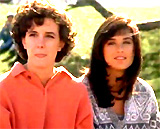 (l to r): Joan (Elizabeth Perkins), Debbie (Demi Moore) 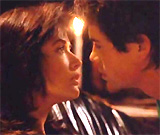 Kiss Before One-Night Stand Sex (Off-Screen) 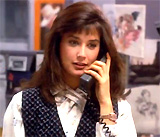 The Next Day - Debbie to Danny: "I was pretty drunk last night" 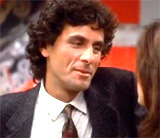 Debbie's Sleazy Boss Steve (Robin Thomas) 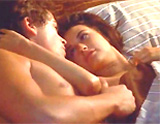 Debbie's 2nd Night With Danny 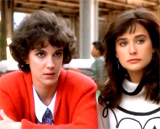 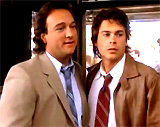 Debbie and Danny with Friends Joan and Bernie 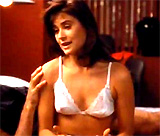 Debbie's Break-Up Scene with Steve 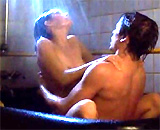 Debbie In the Bathtub with Danny 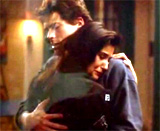 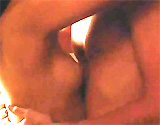 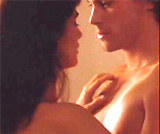 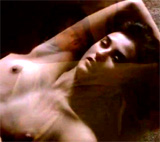 Danny and Debbie Struggling with Being Roommates (Third Montage) 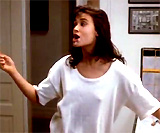 Debbie's Dissatisfaction: "Maid service is not included in the package" 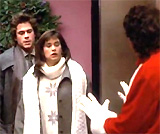 Danny's Jealousy Over Debbie's Ex-Lover/Boss Steve 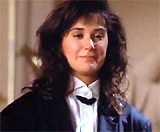 Debbie Regarding Their Breakup: "I'm gone. It's done." |
||||||||||||||||||||||||||||||

|
Amazons in the Temple of God (1986, Fr.) (aka Les Amazones du Temple D'or, or Golden Temple Amazons) Director Alain Payet's jungle adventure/action film, a tale of vengeance, was from the Eurocine studio (famous for trashy cheap fare). It was not to be confused with Amazons (1986, Argentina), a fantasy adventure film directed by Alejandro Sessa. Jesus Franco (aka Jess Frank) was the source for both the original short story and screenplay.
Due to its subject matter, many scenes included topless 'native' all-white Amazonian women warriors.
Its tagline referred to its plot - an expedition in search of a secret golden temple:
The film's pre-titles opening sequence (shot in slow-motion) was of a group of topless females in skimpy gold outfits riding by on horseback, carrying spears. They rode to a mission where a family lived:
The group of female Amazonians arrived at the mission. When Mr. Simpson appeared on the porch with a shotgun and threatened them to leave, he was lethally shot in the chest with a poison-tipped arrow, and so was his wife. After the group departed, Liana ran onto the porch and found the dead bodies of her parents.
The tale of exactly what had happened that led to the deaths of the parents of young and illiterate Liana was described by the head of the mission, a family friend named Father Johnstone (Olivier Mathot/Matthew). He arrived to speak to the orphaned Liana, who had been raised by servants for 10 years. He told her about the fate of her parents from her father's diary read to her. According to the diary (in flashback), her father had discovered that a neighboring, hostile Amazonian tribe, led by an animal skin-wearing priest-king known as The Great Uruck (William Berger), had built a secret mountain kingdom over a cave to hide a cache of gold - and had enslaved workers to extract the valuable mineral. He had stolen some of the treasure from the Gold Temple. Although Liana's father had been warned to depart by a topless warrior woman and leave behind the stolen gold, he refused. The group returned and murdered the two missionaries. Now 15 years later, Liana (Analía Ivars as adult, credited as Joan Virly) - after hearing the account of the deaths of her parents, vowed vengeance ("I must find the killers of my parents").
With clownish witch doctor/shaman Koukou (Stanley Kapoul) and her pet chimp Rocky, Liana joined an expedition to the Blue Mountains with:
During their trek, Bella went skinny-dipping in a lake formed by a waterfall and afterwards spotted a cave where gold treasure was located - she was taken captive by the Amazonians. Soon after, the rest of the group was also captured and held in the same cell. Eventually, the group came face-to-face with Rena (Eva León), introduced as the one-eyed captain (with a black eyepatch) of the Amazon honor guard - she was Uruck's cruel, sadistic mistress, although he also maintained a harem as the procreating patriarch of the clan. An epic struggle, duel or female catfight was set to occur between Rena and Liana in the film's conclusion, over who would take over Uruck's harem. Rena challenged Liana: "I warn you. Don't you dare try to seduce my lord and master." Their contest was to see who could draw "first blood."
After vanquishing Rena by scratching her face and drawing blood, Liana was led away by Uruck to his chamber. As he slept, she remembered the murder of her parents. She unleashed a long knife - shown next to a huge close-up of her right breast - she raised it and stabbed Uruck to death. However, Rena was close behind - she shot a poison-tipped arrow at Liana, and the jungle girl was bound up with the captured others. Restrained in stocks, Rena declared to them: "I am the master now - and we are going to have fun!" She decided to cruelly torture them, beginning by whipping Harvey and Bella, roped together back-to-back next to a bed of spikes. Meanwhile, pet chimp Rocky rescued everyone, but they were too late to save Harvey and Bella. They witnessed their deaths on the spikes. Witch-doctor Koukou threw some powdery explosive at Rena and killed her. In the undramatic ending after Rena was dead, Liana released other enslaved mine workers and led everyone out of the temple cave. She threatened the remainder of Rena's honor guard of female warriors, warning them to leave by nightfall. And Koukou began bragging and shouting: "Koukou kill evil!" In the final scene, Liana was riding an elephant with surviving bearded jungle guide Bud, telling him: "My parents died so long ago, I'm used to my freedom." He replied that he was interested in a relationship: "But whether lover, husband, or father, time will help....Whaddya say?" She responded with the film's last line: "I don't own this jungle." |
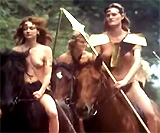 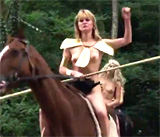 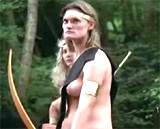 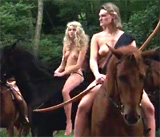 Pre-Titles Opening Sequence 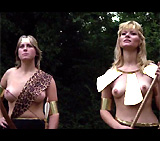 Flashback - Rerun of Deadly Confrontation with Mr. Simpson   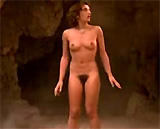 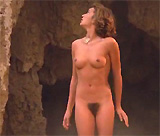 Bella (Alicia Príncipe) Skinny-Dipping and Exploring a Cave 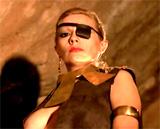 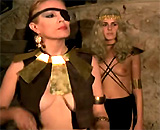 Rena (Eva Leon) 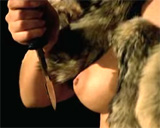 Liana With a Knife to Stab Uruck to Death 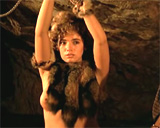 Liana Bound But Not Defeated 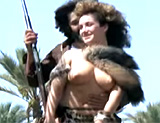 Liana Victorious |
||||||||||||||||||||||||||||||

|
Back to School (1986) The main characters in the "guilty pleasure" film were:
Thornton was an enterprising businessman, who advertised his unique clothing stores on TV commercials:
In the opening minutes of the film, Thornton divorced his promiscuous wife, and then ordered his bearded chauffeur Lou (Burt Young) to drive him via limousine to his son's campus. Thornton's first stop was the Π N sorority house - where he took a wrong turn into a sorority shower-room and startled sorority Co-ed #1 (Leslie Scarborough (aka Leslie Huntly)). When her nudity was mistakenly revealed behind the shower curtain, Thornton stated: "Take it easy, honey, I didn't see a thing," then opened the curtain a second time for another look: ("You're perfect").
Soon after, the wise-cracking Thornton bribed Dean David Martin (Ned Beatty) to attend school as "the world's oldest living freshman" by offering a generous philanthropic donation to build a campus building - the Melon School of Business Administration. Thornton's intention by improbably attending school at his age was to host beer parties and find romance as the BMOC ("big man on campus"), rather than go to class ("These classes could be a REAL inconvenience"). Immediately, he took a romantic interest in blonde English literature professor Dr. Diane Turner (Sally Kellerman), the girlfriend of the stuffy Business School Dean Dr. Philip Barbay (Paxton Whitehead). In her class, he was turned on by her erotic rendition of the ending of James Joyce's novel Ulysses - and imagined making love to her:
To pass his classes, Thornton hired a professional expert (including a stenographer) to take notes and to write his papers (including Kurt Vonnegut (as Himself)) and ultimately was accused of "academic fraud". He was forced to submit himself to a difficult oral final examination by a panel of professors, beginning with a difficult 27-part question on global business organization. Three of the film's highlight sequences included Thornton's wild dance-and-song rendition of "Twist and Shout" with a band in a bar, the climactic championship dive meet with Thornton's display of a "Triple Lindy" dive off the higher and lower diving boards with a somersault (a dive off the pier at Atlantic City that he had performed in the water show in his younger days), and the final obligatory commencement address at the end of the school year delivered by Thornton. He offered words of advice in a short speech:
As the graduates threw their caps into the air, the closing credits began to play, to the tune of Aretha Franklin's version of "Respect." |
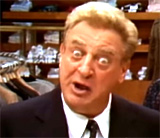 Thornton's TV Ad for "Fat and Tall" Shops 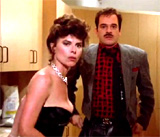 Thornton's Wife Vanessa (Adrienne Barbeau) Caught Cheating with Giorgio   Co-Ed # 1 (Leslie Huntly) 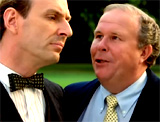 (l to r): Dr. Philip Barbay and Dean David Martin 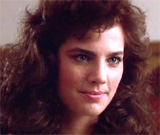 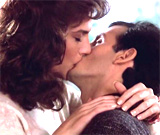 Jason's Romantic Interest - Valerie Desmond (Terry Farrell) 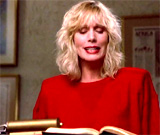 English Literature Professor Dr. Diane Turner (Sally Kellerman) Reading Erotic Quote from James Joyce 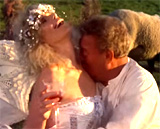 Thornton Imagining Making Love to Dr. Turner 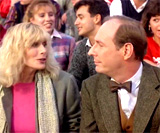 Dr. Turner's Stuffy Boyfriend Dr. Barbay |
||||||||||||||||||||||||||||||
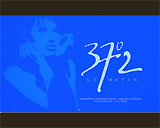
|
Betty Blue (1986, Fr.) (aka 37°2 Le Matin) Director Jean-Jacques Beineix's erotic arthouse drama of tragic, doomed love was a big commercial hit in France. Its title referred to a body temperature of 37.2 degrees (Celsius) (or 99 degrees Fahrenheit) - at the time of ovulation when a woman was most apt to become pregnant. It had a sole Oscar nomination for Best Foreign Language Film. It was based upon the 1985 novel by Philippe Djian. There was a longer running time (185 minutes) for the original Director's Cut release compared to the North American release length (119 minutes). The emotional French sex drama was noted for its opening - an ardent, extended thrusting love-making scene set in a borrowed beachside shack on southern France's Mediterranean coast (in the town of Gruissan) - filmed with a two-minute slow-zoom toward a couple who were lying sideways having sex on a bed beneath a portrait of the Mona Lisa:
The subtitles translated Zorg's first ominous, film-noirish words (in voice-over): "I had known Betty for a week. We made love [or screwed] every night. The forecast was for storms." The next time he saw her, she arrived at his elevated beach-house. She was first viewed at foot level, where she had deposited her one suitcase and purse at his doorstep. As the camera presented her in full-view, she was wearing only a bra-less black apron fashioned into a halter dress. She climbed the steps where he greeted her:
Although he kissed her, he wasn't pleased to see her so unexpectedly. She called men "all bastards" and pushed him away. Often used and abused by men, she was planning to move in with him after her previously failed job, and now she was broke:
He brought her things in from the door and put them on the bed, causing her to smile. He described her (voice-over): "She was like a flower with translucent antennae and a mauve plastic heart. Not many girls could dress as casually as she did." She soon told him when they got drunk: "I'm happy being with you. I'd like to stay with you if I can." Zorg's boss demanded that he must paint all exteriors of the 500 bungalows, and she had to earn her way to stay there with him ("I don't think you can keep that girl here and do your job right"). As they were playfully together painting the beach houses in bright pink and turquoise colors, she took Polaroid photographs of them. But when the boss came by to complain, she tossed a full can of pink paint onto his car hood. Zorg vowed his steadfast love for her - and that he would do anything to keep her: "I’ll paint the whole town pink just to stay with you, kitten." She fought back: "Look what s--t we're in with that asshole! You let him screw you and for what?!...How can I love you if I can't admire you? We're only learning how to die here." Then, during the couple's fierce argument, she discovered a box of his manuscripts and notebooks, and her demeanor changed. She read them with intense interest, and believed that he was a genius writer, although she emphatically stated: "To think you paint shacks drives me crazy!" When he was out painting, she became very devoted and loving and turned to traditional domesticity (housework and shopping) - she cooked a fancy meal for them and became very loving. She detested his boss who called her a "hellcat," and became angry about the boss' meddling in their lives. One day after again clashing with his boss, she became furious and displayed her volatile temper. She emptied Zorg's shack by tossing everything out the window. A bystander noted: "Your pad will look very Zen now." Then, Betty burned it down and asked Zorg: "Are you coming?" Their idyllic beach-times ended when the two fled to Paris to live in a small, mostly-unoccupied bohemian hotel with 13 rooms, the Hotel de la Marne, owned by her widowed best friend Lisa (Consuelo de Haviland) (and her husband Frank before he died). Lisa described the dilapidated residence: "It's no 5-star hotel." They were given the top floor's Room #13 to rent, in exchange for Zorg's odd-jobs work. Betty set about to support Zorg and help him publish his masterpiece novel (a cop story with lots of sex) by typing up his various writings and manuscripts and expectantly hoping for a reply from publishers ("Not even a masterpiece gets read unless it's typed"). She insisted to him: "You're a writer, not a plumber! What did I type? A novel!" Betty mailed off his typed work to all the publishing houses in town.
Throughout the film, there were many sequences of uninhibited and explicit sexual activity between Zorg and Betty - and full frontal nudity for both sexes, especially in the longer version, including when she unabashedly coerced her lover to provide her with oral sex by pushing his head down to her genital area. Zorg and Betty formed a close-knit 'family'-like friendship (often fueled by alcohol, music, dancing and good times) with Lisa and her new boyfriend Eddy Sayolle (Gérard Darmon), restaurateur of Pizza Stromboli. Zorg and Betty took part-time jobs as waiters in the "madhouse" pizza parlor, but it wasn't very well suited for Betty's short-fused personality. She stabbed one persistently-rude and demanding female customer (Dominique Besnehard) in the arm with a fork, causing havoc. Increasingly after moving away from the beach, Betty was exhibiting signs of erratic violence, irrationality, self-destructiveness, and mental illness. Eddy was upset by the incident in the restaurant: "She almost killed that woman." Zorg admitted that Betty was stressed due to her obsession with his novel: "Keeps waiting for publishers to reply. That drives her nuts." Zorg was trying to hide nasty rejection letters from publishers to avoid upsetting her. He realized, in voice-over, her increasing madness (as she stood on an overhead train bridge - looking down):
She had a violent hysterical outburst toward one editor (Philippe Laudenbach) at his home with a metal comb across his cheek (that required eight stitches) when the submitted writings were harshly rejected by him. Zorg began to realize she had mental issues: "You're totally nuts," and then rationalized it was due to her monthly periods. To defend Betty, Zorg pressured the editor to not press charges. Zorg remained dedicated to Betty: "You're the best thing that ever happened to me." Betty replied: "If I'd written that book, I'd have a meaning in life." Zorg was less optimistic: "It's only bringing us trouble." He admitted he was suffering from writer's block. After the death of Eddy's mother, Zorg and Betty were fortuitously invited to move into his mother's house in the Southern French provincial town of Marvejols, and run her piano shop. Although life began anew for the couple, and Betty took to scrubbing the floor on her hands and knees. Again, she began to have variable mood swings, including self-harm when she punched through a window pane, and then ran away from Zorg (as he yelled: "You're out of your mind") who was trying to stop the bleeding. Over time, Zorg had become desperate to please Betty and to make her happy, and he improbably promised to move to the country with her, own a house and buy some land ("Everything you see here is yours"). He produced a birthday cake with lit candles from the car's trunk, and then they watched the sunset while drinking wine. She told him: "It's the best present I ever had." Their love was eventually to be destroyed by their instability, possessiveness and literal amour fou (all-consuming love). She was still hoping for his book to be published: ("I dreamed your book was published"). One night while making love before a burning fire, he realized she was taking sleeping pills. When a home pregnancy test was at first positive, Betty was jubilant (although Zorg was worried), but then after it was revealed to be a false positive with an official test, she went into a deep depression ("Life is against me. If I want anything, it's denied me"), and defaced her beauty with excessive makeup. Zorg obliged and severely cropped her hair: ("Even bald, I'd love you"), and surmised: "Betty wants something that doesn't exist. The world's too f--king small for her." She admitted to Zorg: "I hear voices in my head, I'm going insane. It's all over now."
Unwisely, Zorg (in-drag) stole cash at gunpoint from a clerk in the office of an armored delivery van company. When he returned home, he found Betty in a cemetery hoping: "If I was dead. I'd like people to come to see me." He showed her the stolen money, hoping it would cheer her up, but she was underwhelmed: "What's it for?" His drag outfit caused her more enjoyment and she laughed. To get away, they visited the sunny seaside, where Zorg hoped for a recovery: "There must be a paradise somewhere for you and me." However, when Zorg went to buy ice-cream, Betty inexplicably walked off with a young boy and took him to a toy-store, where Zorg found them sitting in a teepee on the second floor. He ran off with her to rescue her from incrimination. In the film's concluding moments, Zorg returned home and found blood splattered around and learned that Betty had gouged out her right eye. She was hospitalized and declared stable, but she was heavily sedated and catatonic. Simultaneously, word arrived that the publisher had accepted Zorg's manuscript and it would be published. He again visited the unresponsive Betty to tell her the good news, and was shocked she was strapped down in bed. He held her in his arms and caressed her breasts, as he told her he would write another novel dedicated to her. Zorg blamed her medications for her conditions, and refused to accept the diagnosis that she was seriously in "a state of shock" without any guarantee that she would fully recover. Totally insane, he was told that she might require electroshock therapy. He resisted the doctors ("You're making her sick"), and was thrown out for being unruly. After considering the situation, he realized that his insane, self-wounded, and broken-down heroine was doomed. He returned to her hospital room in his drag-disguise, and promised her: "We were meant for each other. No one can ever separate us, no one ever" - he mercifully committed euthanasia by pillow smothering. He returned home to sit in silence and remember her. He was now free to proceed with his next novel (as he heard Betty's happy voice in his head asking: "Are you writing?"). |
 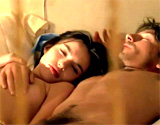 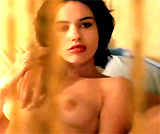 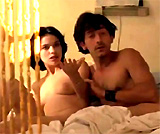 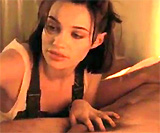 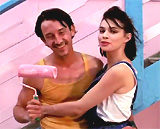 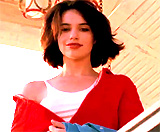 Betty (Beatrice Dalle) with Zorg (Jean-Hugues Anglade) 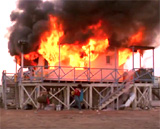 Beachhouse Set on Fire 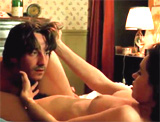  Oral Sex 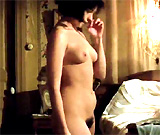 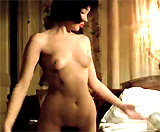 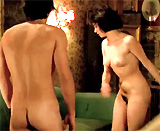 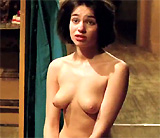 Frequent Casual Nudity 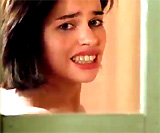 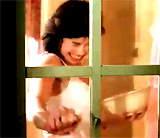 Crazed Betty Punching Through Window 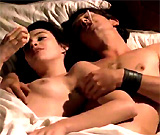 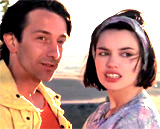 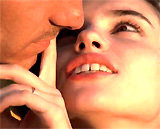 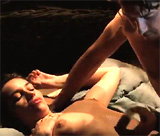 Zorg and Betty 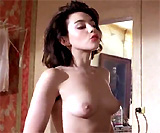 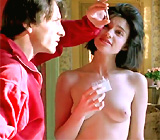 Results of Pregnancy Test - Positive at First 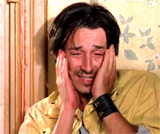 Zorg's Reaction to Betty's Eye-Gouging 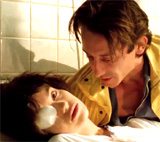 Betty Hospitalized and Lifeless 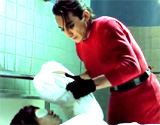 Pillow-Smothering: Euthanasia |
||||||||||||||||||||||||||||||

|
Blue Velvet (1986) Director David Lynch's polarizing, bizarre and nightmarish film of the dark-side of life Blue Velvet (1986) was an original look at sex, violence, crime and power under the peaceful exterior of small-town Americana in the mid-80s. Beneath the familiar, peaceful, 'American-dream' cleanliness of the daytime scenes lurked sleaziness, prostitution, unrestrained violence, and perversity - powerful and potentially-dangerous sexual forces that might be unleashed if not contained. It was considered controversial, shocking, and lurid when released. The compelling film was often criticized for its depiction of aberrant sexual behavior, as well as highly ridiculed and disdained as an extreme, dark, vulgar and disgusting film, especially for its cinematic treatment of Isabella Rossellini - director Lynch's wife at the time. The town's clean-cut, innocent, All-American returning college student Jeffrey Beaumont (Kyle MacLachlan) set out on an odyssey with small-town, virginal and wholesome girlfriend Sandy (Laura Dern), who both found out: "It's a strange world." The voyeuristic Jeffrey became intrigued by fragile nightclub singer Dorothy Valens (Isabella Rossellini) performing "Blue Velvet" - and ultimately found himself attracted to Dorothy and the dark side of life. Hiding in her apartment's closet, Jeffrey watched as Dorothy disrobed to a black bra, black panties, and red high-heeled shoes. She stripped naked in the rear bathroom, and then reached for her blue velvet robe from the closet. He heard a drawer open in the kitchen as she reached for a large knife, and then suddenly flung open the closet door where he was caught hiding. She threatened him at knife-point into intimidation and forced him to get on his knees. She cut his face with the knife blade, turned the tables on him, made him her voyeuristic prey, and forced him to undress in front of her, all the way down to his underwear and socks.
She pulled down his underpants to his knees, then began touching, fondling, and kissing (and fellating?) him, and forced him to remain motionless. She asked: "Do you like that?" and then asked a question combining domination, pain, power, pleasure, and humiliation: "Don't touch me or I'll kill you? Do you like talk like that?" Responding with nervous ecstasy, arousal, but defenseless fear, he was led to the couch to lie down where she straddled him and kissed him. Three loud knocks at the door frightened Dorothy. Frantically fearing the man's arrival and with the knife gleaming above Jeffrey, she told him to head back into the closet. Jeffrey watched in horror, hiding behind a wardrobe closet door, as Dorothy was terrorized by her visitor - evil, psychotic, blackmailing, perverse and depraved villainous kidnapper Frank Booth (Dennis Hopper). The scene was disturbing, cruel, sadomasochistic, and kinky. Demanding and condescending to her, Frank quickly established an abusive master/victim relationship over Dorothy as she accommodated his depraved preferences. The 'dark' scene was intercut with a frightened Jeffrey surreptitiously viewing the shadowy, broken images between the slats of the distasteful ordeal from his hiding place in the closet:
Traumatized, Jeffrey watched Dorothy being tormented as foul-mouthed Frank's sexual slave/whore. He repeatedly demanded that she look away from him - denying her the sight of his 'dark' nature.
The abusive scene was heightened when the leather black-dressed Frank reached for a portable, plastic gas-inhaling mechanism and mask on his belt. While he placed the mask over his mouth and nose, he snorted and inhaled (helium or nitrous oxide?) gas to heighten his sexual excitement, exhibiting infantile-regressive, animalistic/reproductive, and compulsive-addictive behavior. He debased her as a prostitute, mother figure, and copulatory partner in the natural world:
After another gasp of gas, Frank begged and whined menacingly: "Baby wants blue velvet." Dorothy stuffed part of her blue robe into his mouth to satisfy his obsession with textured fabrics. As he began to feel her breasts, he sucked, chewed, and bit the velvet cloth. Then he seized her and threw her down to the floor, spewing vulgar words. Frank removed a pair of scissors, menacingly snipping with them in mid-air above her face and body:
And then after forcefully touching her genitals, he mounted her and started humping her with his unbuckled pants still on. He moved frenziedly faster and faster until climaxing in a brief and brutal f--k. After getting off of her, he slugged her again in the face, hideously threatening her again: "Don't you f--kin' look at me." Standing astride her on the floor before he left, he warned: "Stay alive baby. Do it for Van Gogh." Then he marched out of the apartment, shutting the door behind him and leaving her crumpled on the floor. Subsequently, a consoling Jeffrey took Dorothy into his arms. She opened her robe to reveal her left breast, tempting him. She added:
Jeffrey responded, touching her. She asked: "Do you like the way I feel?" He whispered: "Yes." Then she requested: "Feel me. Hit me," but Jeffrey refused and told her to "stop it," even though she kept pleading: "Hit me!" In a later scene, Jeffrey was lured back to Dorothy in her bedroom, with a rendition of Bobby Vinton's "Blue Velvet" playing in the background - and the sonic signature of a cavernous howling in his ear was heard. In close-up, their naked bodies made love on the blue-silky sheets of her bed. She asked: "Are you a bad boy?" Then, the masochistic Dorothy demanded to be hit: "I want you to hurt me...Go on, hit me. Hit me!" Jeffrey obliged by slapping her in the mouth as he overcame his resistance to abusing her after she begged him to please her - her moist red lips appeared, with sparkling white teeth. Again, he hit her - as the flames grew and the animalistic howling sound intensified during their violent, erotic love-making in the darkness. She told him: "I have your disease in me now."
One of the often criticized scenes of gratuitous nudity was a later scene in which a naked, vulnerable and battered Dorothy shockingly appeared on the Beaumont's front lawn, and entered into Sandy's house with her odd declaration:
Sandy was terribly pained and distraught by the sordid, distasteful accusation, hurt in learning that Jeffrey had a sexual relationship with the nightclub singer. Film critic Roger Ebert Ebert criticized how she was misogynistically depicted in the film: "degraded, slapped around, humiliated and undressed in front of the camera. And when you ask an actress to endure those experiences, you should keep your side of the bargain by putting her in an important film." |
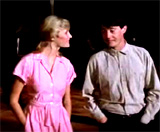 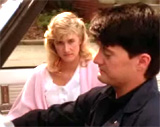 (l to r): Sandy (Laura Dern) and Jeffrey (Kyle MacLachlan) 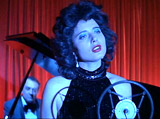 Dorothy Valens (Isabella Rossellini) Singing "Blue Velvet" 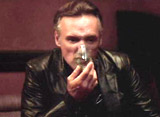 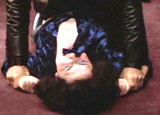 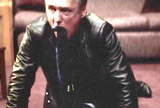 Frank Booth (Dennis Hopper) with Dorothy (Isabella Rossellini)  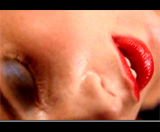  Jeffrey Consoling Dorothy After the Incident with Frank: ("Do you like the way I feel?...Hit me!")  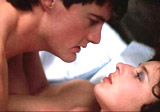   Jeffrey's Later Abuse of Dorothy 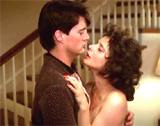  In Sandy's House, Dorothy's Declaration: "He put his disease in me." |
||||||||||||||||||||||||||||||
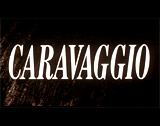
|
Caravaggio (1986, UK) Writer/director Derek Jarman's cinematic achievement was an artful, R-rated, flashbacked biopic, involving a love triangle between:
Lena also served as Caravaggio's Mary Magdalene model. Although the film had little explicit sexuality, the most striking scene involved Ranuccio kissing Caravaggio in order to claim his gold coin payments for having posed. When Lena was found murdered by drowning, suspect Ranuccio was arrested. Carvaggio went to the Pope to get him exonerated and Ranuccio was released. Afterwards, he admitted to Caravaggio that he had murdered Lena to bring them together. Caravaggio angrily sliced Ranuccio's throat and killed him. |
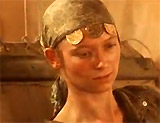 Lena (Tilda Swinton)  Lena and Thomasoni 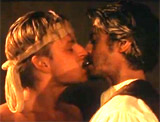 Thomasoni and Caravaggio |
||||||||||||||||||||||||||||||
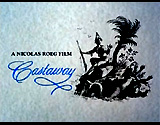
|
Castaway (1986, UK) Director Nicolas Roeg's dramatic, and erotic adventure film (a Robinson Crusoe tale with a male and female) was along similar lines of his previous film Walkabout (1971, UK/Australia). (It was not to be confused with Cast Away (2000) with Tom Hanks, or director Vitaliy Versace's Cast Away (2019) with a single cast member, although it was somewhat similar to Lina Wertmuller’s Swept Away (1974, It.), and was part of a trend of films about sexy desert island survival, such as Emanuelle on Taboo Island (1976, It.), and The Blue Lagoon (1980).) The beautifully photographed film included stunning underwater photography and nature scenes (filmed in the Seychelles in the Indian Ocean off the E. African coast). It was based upon and adapted from the memoirs written by Lucy Irvine of her real-life 13-month experience on an idyllic, remote desert island. She dedicated Castaway to her island partner Gerald and it was published in 1983. The film was also partially based upon Gerald's later memoir The Islander (The Man Who Wanted to Be Robinson Crusoe), published in 1986. There were basically two main characters in the film set in the early 1980s:
She answered his classified ad in Time Out magazine - for a woman who would join him for a year on a deserted, paradisical tropical island, located on Tuin Island (in the Torres Strait between New Guinea and Australia) - the subject of his next book. Gerald had already attempted to be an island castaway two times - Cocos Island in the mid-Pacific, and Robinson Crusoe Island off the coast of Chile. (In all, he attempted to live on three islands in seven years.) He told her over a dinner interview that she was pretty much the right companion: "The most important thing is enough money, right sort of island, proper water supply, right sort of companion." She joked: "In that order?" He continued: "Give me a woman that can cook, sew, put up a tent, fish, like oysters, those could be useful. Think about it." They were forced to marry in order to receive long-term visas from Australian immigration officials. For her role as the uninhibited Lucy, Donohoe was required to be naked (or nearly nude) for about 22 minutes of screen time (after the first half hour). Once they were alone on the island, she immediately stripped down stark naked from her two-piece black bikini - causing Gerald to rush at her - although she blocked him by holding up a large water bottle, asking: "Tea?" For much of the film, she withheld sex from Gerald.
As the ill-matched pair spent more time together, they squabbled as any dysfunctional married couple might in isolation - about different work habits and their survival against the elements, starvation, insect stings, dehydration, foul water, sunburn and infections - and they engaged in acrimony and a continual power struggle, although usually made up afterwards. With his constant brooding, anger issues and their many disagreements, they ultimately separated after 13 months. When they finally parted, they realized their real love for each other. Gerald remained on a different island to live with the natives. |
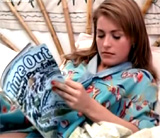 Classified Ad in Time Out Magazine 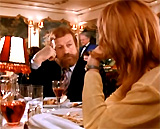 Interview Between Gerald and Lucy 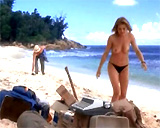 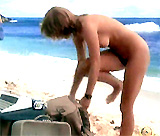  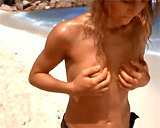 Rampant Nakedness |
||||||||||||||||||||||||||||||
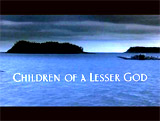
|
Children of a Lesser God (1986) Randa Haines' directorial debut film was about communication and opening up. It told about the slow developing romance between:
He asserted to her:
During a notable swimming pool scene, there was a graceful nude underwater swim and embrace between them. James literally 'fell' in love with her and into the pool:
|
 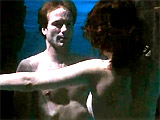 Sarah (Marlee Matlin) |
||||||||||||||||||||||||||||||
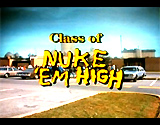
|
Class of Nuke 'Em High (1986) This cheesy, B-film, low-budget high-school horror sex-comedy by director Lloyd Kaufman was produced by Troma Entertainment - the studio responsible for such classics as The Toxic Avenger (1984) (the unofficial lead-in to this film), Zombie Island Massacre (1984), The Toxic Avenger Part II (1989), and many other forgettable films. Its taglines were:
It was followed by two sequels, all classic drive-in pictures:
The film's absurd high school antics (resulting in instances of blood, gore, and boobs) revolved around a nuclear utility power plant that polluted Tromaville High School (in New Jersey) nearby, causing adverse reactions on the students and faculty. There were many side-effects, one of which was contaminated marijuana grown around the power plant (called "Atomic High") that was being sold by the feared gang of Cretins (formerly the Honor Society), led by Spike (Robert Prichard). Various results after smoking included horniness, mutant pregnancies and growths, and super-human strength. The main characters were two clean-cut, innocent preppies who were sexually stimulated by the weed:
Turned on after smoking grass, Chrissy became irresistibly horny and "hot" and began rubbing her entire body as she reclined on a bed. Warren arrived and after he realized how receptive she was, the two virgins began making out in an upstairs room during a beach-themed party. She removed the straps on her blue bikini top and exposed her breasts to him, and he couldn't resist having sex with her - with minimal conversation:
Soon after, that night, he developed an "atomic erection" - in a dream. Speedily, Chrissy became pregnant and then during cheerleader practice, she coughed up her greenish, mutant, tadpole-like baby creature into the toilet. In the film's ending, the mutant offspring set off on a bloody rampage from its location (inside a barrel of radioactive goop) in the school basement. |
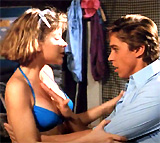 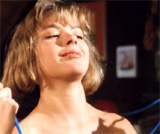  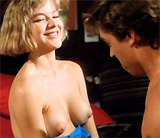 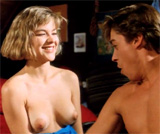 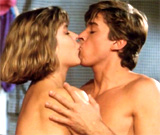 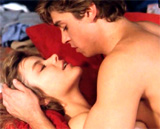 Chrissy (Janelle Brady) and Warren (Gil Brenton) |
||||||||||||||||||||||||||||||

|
Rebellious and provocative Italian film director Marco Bellocchio made this controversial X-rated erotic film (also available in a toned-down R-rated version) with a heavy dose of politics. It was reportedly one of the first X-rated art films to be distributed in the US by a mainstream studio (Orion) after the notorious Emmanuelle (1974). It arrived in theatres when two other highly-acclaimed X-rated arthouse films were still in recent memory: Last Tango in Paris (1972), and In the Realm of the Senses (1976, Jp.). It was a very loose updating of Raymond Radiguet's 1923 romantic novel about star-crossed lovers, set during World War I about the passionate affair of an adolescent boy with an older woman who was married to a French soldier at the front. The novel had already been filmed in 1947, with 25 year-old Gerard Philipe in the role of the 16 year-old teenager. It was also remade by director Scott Murray as the M-rated Beyond Innocence (1989, Australia), and by director Steve Cohen as the R-rated (direct-to-video) exploitational psycho-thriller Devil in the Flesh (1998) starring Rose McGowan.
The three major roles (composing an amour fou love-triangle) in this second filmed version of the story were in present-day Italy (the 1980s):
Giulia's fiancee Giacomo was imprisoned and on trial for terrorism: sabotage and murder. She dutifully attended his trial in a courtroom, where he was held in a large white cage with bars. Andrea had already become intrigued by her when he was in a classroom and first spotted her wearing a slip on her balcony (during the opening scene of a threatened suicide on a rooftop), and followed her on his motorbike. He joined her in the courtroom, after which she invited him to her apartment - it was rented by her prospective mother-in-law Mrs. Pulcini (Anita Laurenzi) for her to stay in during the trial - and was intended as her future home with Giacomo. An afternoon of rowboating led to the beginnings of a passionate lustful affair between Giulia and Andrea in the apartment. In one of the film's many twists or subplots, it was revealed early on that Andrea's father was Giulia's ex-psychologist. He was tempted to have sex with her - she emerged from his therapeutic couch naked, and aggressively approached him in his office (begging: "Give me a kiss, what will it cost you?"), although he diagnosed that she was "completely mad." She even admitted: "Because I was born this way, I'm crazy."
Giulia and Andrea unsuccessfully attempted to keep the affair secret from Mrs. Pulcini and from Andrea's Freudian psychiatrist father.
It was one of the first major films to feature an international, well-known mainstream actress (Maruschka Detmers) performing an unsimulated oral sex act of fellatio on screen (almost 20 years before the same kind of scene in The Brown Bunny (2003)). In the scene, Giulia was lying with her head in Andrea's lap as she unzipped his fly to deliver oral sex as she asked: "I want a nice story." In contrast to the bold sex that was occurring on-screen, the pleasured Andrea was relating the political story of Lenin's return arrival to St. Petersburg in the spring of 1917.
Pressure mounted on their heated affair as the trial was coming to an end, and she would be forced to make a choice between the two males. |
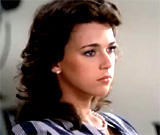 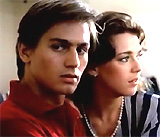 Giulia Attending Trial of Her Fiancee Giacomo - With Andrea 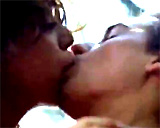 First Passionate Kiss: Giulia and Andrea After Rowboating 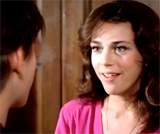 Giulia Giggling with Andrea When He Told Her: "I'm in love with you" 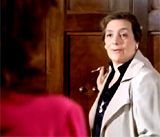 Almost Caught by Mrs. Pulcini, Giulia's Future Mother-In-Law 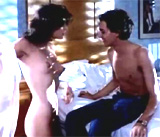 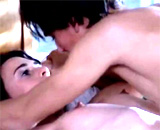 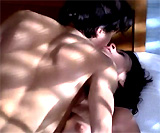 Giulia's First Love-Making Sequence with Andrea 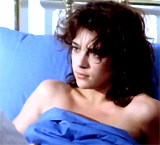 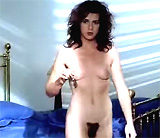 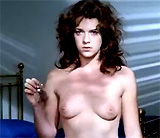 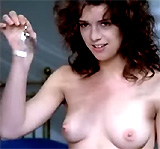 Giulia Holding Up Apartment Keys to Andrea 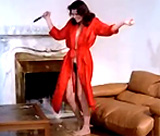 Naked Dance with Knife 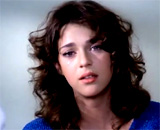 Ending Lengthy Image of Tearful Giulia |
||||||||||||||||||||||||||||||
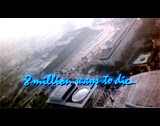
|
8 Million Ways to Die (1986) Director Hal Ashby's last under-rated film was this R-rated edgy, unconventional and believable police-crime thriller, boasting a screenplay co-written by Oliver Stone and adapted from Lawrence Block's 1982 crime novel of the same name (although Stone reportedly disowned the film for its many improvised lines and revisions). The film opened with an ambitious tracking shot filmed from a helicopter over Los Angeles. The central character in this neo-noir referred - in voice-over- to the film's title with a line of dialogue taken from the Naked City TV show (with four seasons of episodes from 1958-1963) - it always concluded with the narrator's iconic statement (in italics):
Budgeted at $18 million, it was a monumental flop (at $1.3 million) - one of three film disasters that forced its independent production-distribution company Producers Sales Organization (PSO) into bankruptcy (the other two films were The Clan of the Cave Bear (1986) and 9 1/2 Weeks (1986)). Its taglines were:
The first tagline referred to the main character:
An unnamed female member of the AA meeting, following Matt's 6-month sobriety award, invited him to a private gambling club party at a luxurious hill-top mansion (with a miniature train elevator tram from the parking level), after telling him: "Someone wants to meet you. I think you'll want to meet them, too." There, Scudder was initially approached by a tall and lanky female in a white dress who was aggressively sexual toward Scudder for unknown reasons, and claimed she was "an old friend." She even called him: "My guy!"
She introduced him to three other central characters:
Later, Sunny wished to entice him away ("You wanna go for a ride"), and met him later at a local bar (to order banana daiquiries). She asked: "What are you doing in a bar if you are trying not to drink? Do you like making it hard on yourself?" She then invited herself to his apartment closeby, and revealed she knew he was a cop (or ex-cop). She offered him $5,000 for access to influential people he might know. After stripping naked in his bathroom and high on cocaine (and booze), she offered him her full-frontal nudity and the bold line:
But he was intimidated by her and refused her typical come-ons for drugs and sex, unsure of her motivations: ("You're not only a whore, you're a dumb whore"). He lectured her: "What in your experience tells you a man is more reliable because he's going to f--k you?...Predictable is not reliable...Whether it's for money or not, getting f--ked is usually getting f--ked." When she expressed desperation and fears of being harmed by her pimp 'Chance' for wanting out of the hooker business, she asked for Scudder's protection. Scudder returned to the mansion and negotiated with 'Chance' to release Sunny from her obligations to him for $2,500, but was refused since he insisted that he wasn't her pimp: ("Sunny may be a high-priced whore, but who, when and for how much it's strictly her business....I am not her pimp, I'm nobody's pimp and if I was a pimp, I'd be the most pussy-whipped pimp in this town. No one pays me for the privilege of being a whore. Anybody around me wants to sell themselves, they do it strictly on their own"). Sunny still didn't trust that she was freed from 'Chance' ("Can't you see through him? It's all an act. He's gonna hurt me, I know it").
On the way to the airport after provided with a ride by Scudder, Sunny was kidnapped in a van and savagely killed (shot in the back and thrown off a bridge onto a storm drain below). After Sunny's death, Scudder went on a harmful drinking binge and blacked out for three days. He had been admitted unconscious for two days to a drug detox-rehabilitation hospital ward. After recovering, he temporarily vowed to seek revenge for Sunny's killer. He was left with some of Sunny's possessions in his trunk, including her zippered duffle bag with:
All items pointed to Sunny working as a drug-runner/pusher for Angel, and she was in the midst of fleeing town with his drug money. In the rear warehouse of a local PoBoys Market, Scudder watched as Hispanic workers piled up compressed wooden logs. They were ordered to move them and stack the logs upstairs and out of the way (so they would not be sold) - a major clue. Scudder learned that 'Chance' was the owner of the store (possibly used for laundering drug money and for pushing drugs), and had ordered the move. Scudder befriended Sarah to find out about Sunny's past and her criminal associations. At first, she was wary of him: "I think you're a f--kin' freeloader, a lush and you got Sunny killed," and was being closely watched by Angel. Scudder realized that Angel had the tell-tale missing jewel cat-charm from Sunny's necklace on his ring - marking him as the prime suspect. He extracted Sarah from Angel's control by "roughing" her up and kidnapping her, and they ended up at his apartment while he was interrogating her. She became so intoxicated after drinking Stolli vodka that she threw up into his groin area after telling him: "I'm gonna f--k you so good." He helped her take a cold shower followed by a chaste night's sleep.
The next day, she cleaned his kitchen and the two became better acquainted - and inevitably more romantically interested in each other. He had convinced her that Angel was imminently dangerous, and the two began to work against him. In a tense face-to-face meeting at the Coliseum, while eating shaved ice sno-cones, Scudder accused Angel of murdering Sunny for stealing his $250,000 of drug money (now in Scudder's possession). Scudder also suspected that Angel was moving drugs through 'Chance's' supermarket operation (without his knowledge), since 'Chance' had refused to get into the drug-pushing business with him. 'Chance' was completely unaware that Angel's drug-shipments were already being moved through his chain of PoBoys supermarkets. Scudder coordinated with 'Chance' to set up a drug deal by providing $250,000 in funds (added to the other drug money) to meet Angel's demand of $500,000 - it would also serve as a bargaining ploy for Sarah's release. Scudder visited with Angel again - this time at his recently-purchased, uniquely-designed 12-room Beverly Hills home in the midst of renovations. Uncaring, cold and heartless, Angel explained how Sunny's death sent an example:
As the film-noirish story wound to its complex conclusion, it became clear to Scudder that Sunny hadn't been afraid of her pimp 'Chance,' but fearful of Angel. He explained to 'Chance' why Sunny had earlier sought Scudder's protection - and how Angel had already infiltrated with drug shipments and workers, not into 'Chance's' club, but into 'Chance's' chain of supermarkets:
'Chance' was unaware that Angel's stored logs in his supermarket warehouse were concealing cocaine. He was flabbergasted when he was shown the logs holding bags of white cocaine powder worth thousands of dollars. 'Chance' and Scudder loaded up their cars with 150 of the logs, to use as a bargaining chip against Angel. As expected, Angel turned on Sarah. He suspected that Sarah had allied herself with Scudder and had told him about the cocaine. The film's tagline came into play: "He's already failed as a cop. If he fails again, it's her life." The film concluded with two shootouts:
In the film's unusual happy ending, Scudder was again sober (now for five weeks) and happy to be in love with Sarah. He addressed a beach-side AA meeting with a newfound realization - and then walked along the water's edge with Sarah in his arms:
|
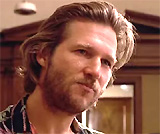 "Matt" Scudder (Jeff Bridges) 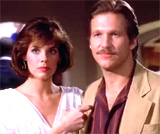 (l to r): Sunny (Alexandra Paul), Matt  Sunny 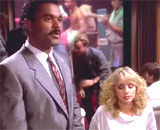 (l to r): 'Chance' (Randy Brooks), Sarah 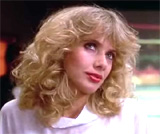 Sarah (Rosanna Arquette) 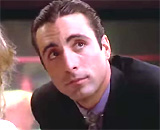 Angel (Andy Garcia) 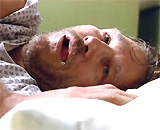 Scudder Waking Up in a Detox Ward After Sunny's Death
|
||||||||||||||||||||||||||||||